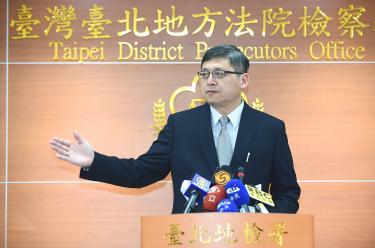An investigation into New Party spokesman Wang Ping-chung (王炳忠) has found that China’s Taiwan Affairs Office (TAO) allegedly promised to pay Wang NT$15 million to NT$16 million (US$506,278 to US$540,030) annually for running the pro-unification propaganda Web site Fire News (燎原新聞網), the Taipei District Prosecutors’ Office said yesterday.
Wang cofounded Fire News, which Chinese student Zhou Hongxu (周泓旭) helped promote as a consultant, and allegedly used it as a platform to recruit members for an organization he was setting up for the Chinese government, the report said.
In a document titled Fire News 2015 Year-end Working Report, Zhou wrote that the Web site had received US$200,000 in funding from the TAO, of which Wang’s father “lost US$20,000.”
The TAO, the sole financier of the Web site, promised to pay Wang every year starting this year for the operation of the Web site, which is exempted from taxes in China and can be increased if necessary, the report said.
The payment is to be claimed by Wang in Beijing and is to strictly remain that way, Zhou wrote in the Fire News log.
“There will be risks, considering that the ‘green camp’ will become the ruling party next year [2016]. The source of the funds will be shown as donations from disciples of the Chunghua Cultural and Educational Foundation of the Gods (中華文教代天協會) where Wang’s father works,” an excerpt from the log showed.
Prosecutors said that Zhou was instructed by the TAO to recruit current and retired Taiwanese military officials through Wang — an operation codenamed the “Star Fire T Project” (星火T計劃) — and was to offer various financial rewards to Wang and others, depending on the value of the contacts they introduced.
The operation was aimed at infiltrating the military through obtaining confidential information from digital networks and databases, deepening existing contacts, holding military-related events and filing academic research reports, prosecutors said.
A reward of NT$3,000 was to be offered for each contact who follows Fire News’ Facebook page, as long as the member read and “liked” at least 70 percent of its posts.
For each member who interacted with the page’s content creators at least once every two weeks for a minimum of two months, NT$5,000 was to be offered.
Rewards of NT$10,000 were to be given for securing offline meetings with contacts, with the aim of developing closer relationships and building trust by having the contact share personal information and take photographs together.
For closer two-person exchanges in which the contact opened up about their feelings regarding politics and deeply personal information, a reward of NT$50,000 was to be given, prosecutors said.
Following these encounters, Zhou, Wang and others were to report to the TAO for further instructions.
Zhou also wrote that the Web site’s content is overseen by New Party youth wing executive Hou Han-ting (侯漢廷) and produced by about five writers.
The office yesterday issued a new indictment charging Zhou with violating the National Security Act (國家安全法) and forwarded the findings to the Taiwan High Court without suggesting an extension of Zhou’s prison term.
The move came two weeks after the office’s search and arrest of Wang, Hou and two other New Party members, who were taken to the Investigation Bureau for questioning as witnesses in the case.
The questioning sparked controversy after it was found that the search warrant investigators used had not been signed by a judge.
Prosecutors in July last year charged Zhou with “colluding with an enemy of the nation to create organizations” — a violation of the National Security Act.
The Taipei District Court in September last year sentenced Zhou to 14 months in prison. The case is being investigated by the High Court after Zhou appealed the verdict.
Zhou in September 2012 enrolled at National Chengchi University, and in July 2014 went to Shanghai, where he met a secretary at a Chinese government agency surnamed Lee (李), who invited Zhou to several banquets and allegedly promised him monetary rewards in exchange for introductions to Taiwanese politicians, military personnel, police, intelligence officers, diplomats and influential figures, the office’s report found.
Lee had allegedly planned to arrange meetings between Chinese and Taiwanese officials in China or overseas to steal classified data from Taiwanese authorities, the report said.
Zhou in turn set his sights on a nascent Taiwanese diplomat, repeatedly encouraging them to work for the Chinese government, which offers generous salaries in addition to a quarterly bonus of US$10,000, the report said.
He also allegedly encouraged the diplomat to travel to Japan and promised to introduce them to Chinese officials there, it said.
Zhou’s lobbying alarmed the diplomat, who reported Zhou, it said.
The office said that it in March last year, during a raid of Zhou’s apartment, uncovered his correspondence, which showed that Zhou had been in contact with Wang and other New Party youth wing members, with whom he exchanged political views and discussed current issues.
It said it suspected that Zhou had planned to turn the four New Party members, but since it did not have hard evidence of their involvement in Zhou’s case or leaking of confidential information, they were only summoned as witnesses.
Source: Taipei Times - 2018/01/03





















